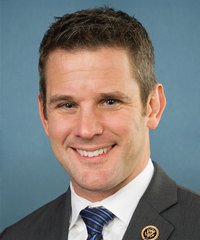
Adam D. Kinzinger is currently serving his sixth term in the United States House of Representatives and proudly represents Illinois’ Sixteenth Congressional District, which stretches across 14 counties in Northern Illinois.
Congressman Kinzinger serves as a member of the House Committee on Energy and Commerce and the House Foreign Affairs Committee. His top priorities include strengthening U.S. energy policy and making our nation less reliant on foreign resources as well as bolstering the strength of our national security – both at home and abroad.
Just as every family in America must live within their own means, so too should the federal government. Washington cannot govern responsibly if it continues to spend more than it takes in year after year. Out-of-control spending weakens our economy, threatens our social safety net, and sets up future generations to inherit a bankrupt nation. In order to ensure our kids and grandkids have the same opportunities we’ve enjoyed, difficult decisions must be made to place our finances on a sustainable path.
I am committed to working with my colleagues in Congress to end Washington's culture of reckless spending. We must work together to address the drivers of our debt, reform our broken budget process, and bring stability to our finances. It is our duty to leave future generations with a better country than the one we inherited, and we must not fail them.
The Debt
Our national, state, and local debt currently exceeds $27 trillion, which equals $90,000 owed by every man, woman, and child in America, regardless of income. The non-partisan Congressional Budget Office (CBO) estimates we will add about $13 trillion to our debt over the next 10 years if nothing is done. This path is unsustainable and will only get worse over time if we continue to ignore our spending problem. While Congress needed to act and provide relief for American people during COVID-19, now more than ever, we need to focus on reducing unnecessary spending and tackling the largest drivers of our deficit and debt.
A Budget that Balances
During my time in Congress, I have supported budget resolutions that would balance the federal budget in 10 years by gradually restricting annual spending, lowering our debt-to-GDP ratio, and enacting pro-growth policies to create millions of new jobs—all while preserving social safety net and retirement programs for current and future beneficiaries.
In an effort to get us closer to a balanced budget, I introduced the Truth in Spending Act. In short, this legislation would create an expedited path of consideration for measures to cut spending that has exceeded its original cost projections. For more information on this measure, please see more at the bottom of this page.
Reforming our Broken Budget Process
For too long, budget gimmicks and loopholes have given way to overspending, thereby piling more debt on the American people. I have cosponsored and voted for numerous bills that would eliminate these gimmicks and inject some much-needed transparency and common sense into our budget process, including:
The Truth in Spending Act
Since 1970, direct spending—which refers to spending determined by eligibility instead of the appropriations process and includes programs such as Medicare, Medicaid, and Social Security—has grown from 31% of annual federal expenditures to 63% today. Some economists project that by 2047, the federal government will be spending 21% of its annual expenditures on paying down the interest on public debt, about 61% on direct spending, and 18% on discretionary spending, including defense spending.
This kind of spending is untenable and leaves taxpayers vulnerable, which is why I introduced the bipartisan Truth in Spending Act.
This legislation creates spending accountability measures by instituting a Congressional “fast-track” process for consideration of legislation that reduces federal spending at rates commensurate with the over-spending, as compared to the original cost projections.